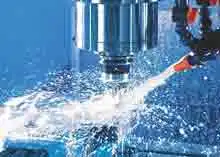 What are the Lubricity Additives??
What are the Lubricity Additives??
Lubricity additives are specialized chemicals, agents additives designed to enhance the lubricating properties of metal working fluids especially water soluble fluids.
Normal water-based metal working fluids do not have the capacity to offer sufficient lubrication for metalworking operations. This is because water is not a very good lubricant. As a result, using water-based metal working fluids without a lubricity additive can lead to a poor surface finish, reduction in dimensional accuracy, reduction in life of the fluids.
Normal soluble cutting oils, water-based cutting oils are the emulsions of the mineral oils however when oil becomes water soluble their ability to reduce the friction reduces drastically. Hence cutting oils do not have the capacity to offer sufficient lubrication for metalworking operations. . As a result, using water-based cutting oil without a lubricity additive can lead to a poor surface finish.
Lubricity is a critical factor in the performance of water-based cutting oils and water-based semi-synthetic cutting oils used in various metalworking applications. To achieve optimal cutting efficiency, tool life, and surface finish, manufacturers must have to incorporate efficient Lubricity Additive sin their MWF formulations.
Friction Reduction: Lubricity additive creates a thin, protective film on the tool and workpiece surfaces, minimizing friction and heat generation during cutting operations.
Temperature Control: The reduced friction and improved heat dissipation provided by. Lubricity additive help maintain optimal operating temperatures during machining.
Surface Finish Enhancement: Lubricity additive contribute to achieving superior surface finishes by minimizing tool marks, abrasions, and defects on the workpiece.
Wear Prevention: By forming a lubricating barrier Lubricity additive effectively reduce tool wear, extending tool life and reducing the need for frequent replacements.
When formulating high-performance MWFs and cutting oils, chemists must carefully consider the type and concentration of lubricity additives to use. The following factors should be considered:
Machining operation: The type of machining operation being performed will influence the type and concentration of lubricity additives required. Heavy-duty machining: For heavy-duty machining operations, such as turning and milling, chemists can use a combination of mineral oils and synthetic esters to create a MWF with high lubricity and extreme pressure performance.
Type of Metal machined: The metal being machined will also influence the type and concentration of lubricity additives required. Different lubricity additives are required for machining ferrous and non-ferrous metals. For machining non-ferrous metals, such as aluminium and copper, chemists can use a MWF with a high concentration of synthetic esters to reduce friction and improve surface finish.
Expected performance characteristics: The desired performance characteristics of the MWF or cutting oil will also influence the type and concentration of lubricity additives used
Compatibility with other components of formulation: Lubricity additives are chemicals & can react with components of other fluid. By carefully selecting lubricity additives, formulator can produce high-performance MWFs and cutting oils that can help to improve machining performance.

